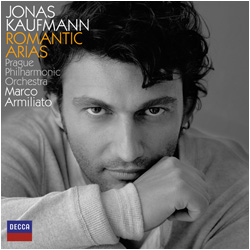|
|
|
|
|
|
|
|
| Telegraph.co.uk |
| Richard Wigmore |
Richard Wigmore reviews Jonas Kaufmann's collection of Romantic Arias
|
Jonas Kaufmann: Romantic Arias: Classical CD of the week
|
|
 Jonas Kaufmann's svelte, un-tenorish physique and swarthy
good looks make him a publicist's dream, as Decca's booklet, larded with
studied-casual fashion shots, duly confirms. With the Latin appearance goes
a voice to match. No German tenor since Fritz Wunderlich has such a
succulent Italianate tone, without a trace of Teutonic grittiness or
nasality. Jonas Kaufmann's svelte, un-tenorish physique and swarthy
good looks make him a publicist's dream, as Decca's booklet, larded with
studied-casual fashion shots, duly confirms. With the Latin appearance goes
a voice to match. No German tenor since Fritz Wunderlich has such a
succulent Italianate tone, without a trace of Teutonic grittiness or
nasality.
Yet Kaufmann is no Wunderlich sound-alike. While his free-ringing high notes
have a comparable visceral excitement, his timbre is a notch duskier and
more baritonal, with more heft in the middle and lower registers. He is also
a scrupulous and sensitive musician, building each of these arias with the
care of a Lieder singer. You'll be lucky to hear Max's aria from Der
Freischütz sung with such subtlety and involvement, from the rapt tenderness
of the opening to a climax of overwhelming despairing intensity.
In Beckmesserish mode you might say that Kaufmann makes the frivolous Duke
of Mantua in Rigoletto too similar to his Don Carlos and Alfredo ( La
traviata ). His voice does not smile easily, though criticism is all but
silenced by the grace and ardour of his phrasing, and those thrilling,
unforced top notes. Kaufmann's darkly impassioned "E lucevan le stelle" (
Tosca ) whets the appetite for his Cavaradossi in the theatre, while the
Flower Song from Carmen, ending with a honeyed high B flat, revives memories
of his triumphant Covent Garden debut.
The one relative rarity here is a gently sentimental aria from Flotow's
Martha, delivered with due elegance. Best of all is the Prize Song (Die
Meistersinger), sung as a true love song, with a kind of inner intoxication
and a variety of colour that I have never heard surpassed.
Marco Armiliato's accompaniments are solid rather than inspiring. But they
hardly detract from a feast of glorious tenor singing. |
|
|
|
|
|
|
|
|
|
|
|
|
|
|
|
|
| |
|
|
|
|
|
|
|
|
|
|
|